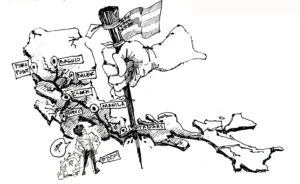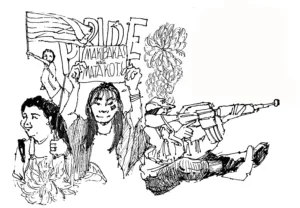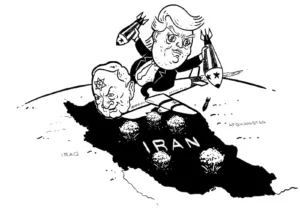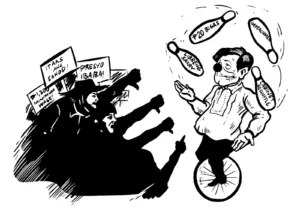Speech delivered at the Famine Walk
Co. Mayo, Ireland
17 May 2014
By LUIS G. JALANDONI
NDFP Chief International Representative
Dear Friends, fellow participants in this Famine Walk,
In the Philippines there is a fierce struggle for food sovereignty being waged by the working people who produce the food but who are denied their basic right to food, health, and life. Peasants, workers, indigenous people and fisherfolk are among 70% of the population who struggle to survive with only PhP100 or €1.70 per day. This measly amount is insufficient to provide the basic daily need for food. Upon sickness, there is no money for medicines. Much less for housing and schooling.
Why is this such, in a country with 9.7 million hectares of fertile agricultural land, marine resources abounding in fish, rich mineral resources with the country no. 3 in the world in gold deposits, no.4 in copper, no. 5 in nickel, and no. 6 in chromite.
This situation of hunger, poverty, disease, and death in midst of plenty is, I think, similar to the situation of the Irish people during the famine. As James Connolly pointed out in his book, Labour in Irish History, the Irish people produced enough for the entire population during the famine, in fact, more than double. Enough grains and other food were produced, but these were exported to England. Connolly declared the English administration of Ireland during the famine a colossal crime against the human race.
The current struggle for food sovereignty in the Philippines is the fight against landgrabbers who take away the land of the peasants and indigenous peoples. It is a struggle against the Manila government’s Public Private Partnership program that gives away the land to foreign corporations, mining companies, and agribusines firms. It is also a struggle against Monsanto, Zeneca, Syngenta, and other such corporations that steal the farmers’ seed varieties and render the farmers dependent on genetically modified varieties. The Philippine peasant movement, with two million members, struggles in the legal democratic sphere. It unites with other Asian movements in the Asian Peasant Coalition.
Many more millions of peasants and indigenous peoples struggle in the revolutionary resistance movement. This movement carries out a genuine land reform program in substantial parts of 71 provinces. The program includes rent reduction, elimination of usury, and land distribution. This is the biggest movement for food sovereignty and national and social liberation.
The struggles in the legal democratic sphere and the revolutionary underground aim to change the current exploitative and oppressive system which favors foreign multinationals and their associates of big landlords and big businessmen.
This unjust system started when Spain colonized the Philippines in the 16th century. The colonialists took over the lands and compelled the peasants to pay tribute and subjected them to forced labor and conscription.
The Filipino people waged an armed struggle for independence in 1896. The revolutionary forces won victory and proclaimed the first Philippine Republic. However, the US came and invaded the country.
In quelling the people’s struggle against US annexation, 1.5 million Filipinos or 20% of the population died. The US then imposed its colonial rule and set up its system of exploitation and oppression. In 1946, it granted nominal independence and ruled the country through bureaucrats it had trained, with the collaboration of big landlords and businessmen.
Through policies dictated by the US through the IMF, the World Bank, and the World Trade Organization, in collusion with subservient Philippine governments, the peasants are deprived of their lands in favor of multinational firms like Dole, mining corporations like Xstrata and Glencore, and logging companies. These destroy the livelihood of the peasants and indigenous people, and ravage the environment.
While these multinationals and their local cohorts reap superprofits, the working people are denied their basic right to food, health, education and life.
In the face of the intolerable exploitation and oppression, a movement for national and social liberation has arisen since the late 1960s. The struggle for food sovereignty is within this liberation struggle.
Now, may I bring up the Irish connection. I refer to Jack Hynes, a missionary who lived and worked in the Philippines, particularly in the island of Negros. He integrated with the poor people, learning their language.
He stood with them in facing the military who threatened them on behalf of the landgrabbers. He joined the fisherfolk in going out to sea. “They live on the edge of death,” he said, “because of the risks they take.”
When Marcos imposed martial law in 1972, he and his colleagues brought food and supplies to the freedom fighters in the mountains. The dictator launched a policy of encirclement to isolate the revolutionary forces. Jack and his colleagues broke through that encirclement. They transported freedom fighters across enemy lines. Jack rescued torture victims and brought them to safety for medical care.
The revolutionaries most hunted by the dictatorship were retrieved from danger by Jack. He and his colleagues like Pat and Vinny Healey, and Donal MacDonald risked life and limb to help the liberation movement.
In the mid-70s, he left the priesthood and married his soulmate, Lulu. Together with their children, they moved back to Ireland. He was a devoted family man.
He and Lulu continued helping the Filipino people’s liberation movement. Upon the arrest of Fr. Niall O’Brien and eight others, called “The Negros Nine”, Jack and Lulu, with the Filipino Irish Group, launched an effective nationwide campaign for their release.
When Redemptorist priest, Fr. Rudy Romano was disappeared in July 1985, he led the FIG in launching a one-year daily picket at the US embassy to protest Fr. Romano’s abduction.
When Jack Hynes died in 2006, the Filipino people presented Lulu with a wooden sculpture with the inscription, “Jack Hynes, Hero of the Filipino People.”
In his honor, and with the aim of keeping alive his legacy of outstanding solidarity, a group of us Filipinos and Irish people are launching “The Jack Hynes Solidarity Project”, with the assistance of AFRI. Jack was very involved in the Famine Walk; he was present in 1988 at the very first Famine Walk. We sincerely hope that the Jack Hynes Solidarity Project will effectively help in building a strong solidarity between the Irish people and the Filipino people.










